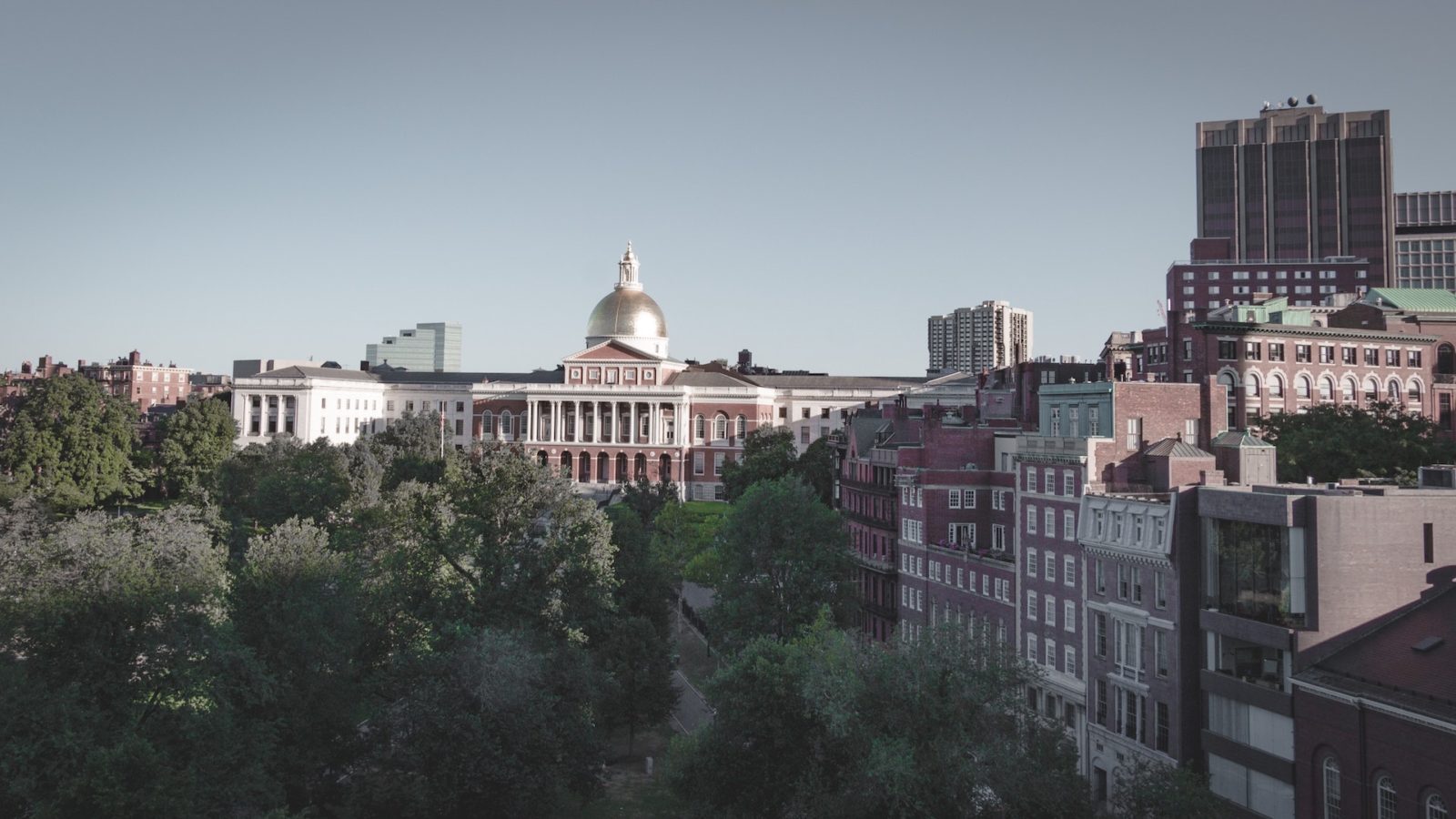The 2021–2022 legislative session in Massachusetts has seen an increased focus on environmental justice, with four exciting bills being introduced thanks to the hard work of organizers, advocates, and community leaders from across the state. These bills come on the heels of the Next Generation Roadmap, a bill signed into law earlier this year that updates the Commonwealth’s climate goals, provides new guidance and requirements around clean energy and utility regulation, updates the state’s building codes to allow for net zero requirements, and creates the state’s first legal definition of environmental justice.
A more detailed analysis of the Next Generation Roadmap law is available here, but the codified definition of environmental justice is more robust and specific, and the law expands what state agencies should consider as an “environmental burden” when assessing projects.
Building from this progress, four significant pieces of legislation have been introduced this session that relate to environmental justice (EJ). Below, we breakdown the four pieces of legislation and highlight key takeaways as the legislative session continues.
1. S.996/H.1792: An Act to Create Access to Justice
Sponsored by Representatives Joan Meschino and Adrian Madaro.
This bill is fundamentally a piece of civil rights legislation that applies to a broad variety of contexts, but has particularly interesting implications for EJ. The bill reinforces that government may not implement a policy or program that discriminates on the basis of any protected class, even by accident, and creates a legal mechanism for people who’ve experienced a disparate impact to sue the state even if discrimination was not explicitly intended.
“In practice, this means that an individual will have the right to bring a civil rights claim arising out of a government policy or regulation that appears on its surface to be non-discriminatory, but actually has a discriminatory effect on a protected group of people when it’s implemented,” Rep. Meschino told Climate XChange.
If enacted, this bill would legally restore a civil protection that was previously enshrined under federal law. The original protection was partly eroded by the Supreme Court decision in Alexander v. Sandoval, in which former Justice Antonin Scalia wrote that Title VI only protected people from intentional discrimination.
This bill recognizes that the impacts of public policies and programs are sometimes different than their stated goals, and that the disproportionate harm that occurs to already-marginalized communities is not only valid but deserves restitution. This harm can be difficult to prove because of the lack of explicit intent, but this bill creates a pathway to do just that. Protecting everyone’s right to access justice is particularly important in the context of decarbonizing our economy, says Rep. Meschino: “We have to be sure that as we’re making all of these changes, we’re uplifting people and giving them the ability to protect themselves.”
2. S.2135/H.3336: An Act relative to Energy Facilities Siting Reform to Address Environmental Justice, Climate, and Public Health
Sponsored by Representative Adrian Madaro and Senator Joseph Boncore.
The Massachusetts Energy Facilities Siting Board is responsible for approving new energy facility construction. Although the Board evaluates the environmental impact of proposed new projects, it currently does not consider EJ or public health concerns as part of its decision-making process.
This bill restructures that process to center around people and make EJ, public health, and climate an explicit part of the Board’s considerations. It also adds additional requirements of community engagement, a cumulative impact statement, and an EJ impact statement to the approval process for electricity generating facilities or oil, gas, or substation facilities. Further, if the EJ impact statement shows that a project will be detrimental to the public health of EJ communities or otherwise cause harm to those communities, that project cannot be approved. Finally, it expands the Siting Board’s jurisdiction to include smaller projects, ensuring that harmful projects won’t slip through under the radar due to relative size.
Energy facilities and their associated air pollution are often concentrated in EJ communities, and the cumulative impacts can be devastating. This bill would fundamentally change the way decisions around these facilities are structured and prioritize the needs and interests of EJ communities.
3. S.1447H.2230: An Act to improve outdoor and indoor air quality for communities burdened by transportation pollution
Sponsored by Representatives Christine Barber and Mike Connolly and Senator Patricia Jehlen.
This bill tackles the extremely timely issue of air quality from a couple of different angles by setting ambitious air quality improvement targets for 2030 and 2035 and laying out the pathways for achieving them.
It increases monitoring of outdoor air quality for a variety of different pollutants in “pollution hotspots,” making it easier to track progress toward the improvement targets. It upgrades mold enforcement through updates to the state sanitary code and halts the installation of new gas stoves through updates to the state building codes. It also sets new filtration installation requirements: existing eligible buildings like schools and some correctional facilities will need to install air filters, and new buildings like hospitals, temporary shelters, and residential developments will need to install advanced HVAC filtration systems.
There is a direct line between air quality and public health. Air pollution is an incredibly clear EJ issue. According to research released earlier this year, particulate matter pollution “disproportionately affects Americans of color, regardless of their state or income level.” COVID-19 has highlighted the ways in which these health impacts layer with numerous other factors to make EJ communities even more vulnerable.
4. H.3292: An Act Achieving a Green Future with Infrastructure and Workforce Investments (aka. The Green Future Act)
Sponsored by Representative Bill Driscoll Jr.
The Next Generation Roadmap set important goals but did not provide the funding needed to achieve those goals. This bill charts the course to “sustainably and equitably raise green money” to meet those goals. The Green Future Act is divided into two broad categories: raising money and providing pathways to invest it.
The Green Future Act raises money in two key ways: by making polluters pay and by establishing green bonds. Massachusetts currently charges a carbon pollution fee for power generation (known as the Regional Greenhouse Gas Initiative), and the Green Future Act would broaden its application to include transportation and heating fuels, which are responsible for the vast majority of Massachusetts’ emissions. The bill also creates a new green bonding pathway in the state’s capital budget process, unlocking over $1.1 billion per year for green investments.
There are four investment pathways laid out in the Green Future Act, which span the breadth of the necessary transition to a cleaner economy. It establishes the Green Infrastructure Fund to invest in projects that contribute to the transition away from fossil fuels, like transportation electrification and consumer rebates for efficient heating, and provides local aid to support cities’ and towns’ infrastructure transition. It also sets up the Green Workforce Commission to support clean, green workforce development, including a $10 million fund for displaced fossil fuel workers. Finally, it provides direct payments to lower-income households to create a buffer in case of short-term utility cost increases.
From an EJ perspective, one exciting aspect of this bill is the requirement that at least 60% of the infrastructure spending must directly benefit EJ populations, not just generate benefits in the nearby neighborhoods or communities they live in. The reason for this distinction is to make sure the state’s investments do not reinforce or contribute to gentrification. The result: the Green Future Act sends over $5.3 billion in funding to benefit EJ communities and populations.
Another key aspect of the Green Future Act, as it relates to EJ, is its requirements around decision making for local funds. When money comes back to municipalities, decisions about which projects it’s spent on are made by a community-based council that is required to include seats for members of EJ communities, as well as youth. This gives EJ community members not only more power to decide how money is spent, but to block uses that directly conflict with the goals of the community.
If signed into law, the Green Future Act will create over 83,700 well-paying, green jobs in Massachusetts and will direct over $5.2 billion in green infrastructure spending to benefit EJ communities through 2030. The investments in this bill will have huge public health and community benefits, ranging from energy cost savings to travel time savings due to decreased road congestion to the public health benefits that come along with decreased air pollution and increased physical activity. The estimated value of these savings, all together, is an average of $2.2 billion per year and totals almost $18 billion between 2023 and 2030.
Key Takeaways
Each of these bills is significant on its own, but together they would be transformative. For example, the facility siting changes should prevent energy facility location decisions from disproportionately affecting EJ communities, but the legal mechanism created in the Access to Justice bill would provide a backstop in case a harmful project somehow gets approved anyway. In a similar way, the Green Future Act would unlock an unprecedented amount of money that would be invested in infrastructure and job creation for EJ communities.
As of now, only one of these bills has been heard by a committee, S.1447/H.2230. According to the session calendar, the legislature will have to take some kind of action (whether favorable or unfavorable) on every piece of filed legislation by February 2022, so there’s still plenty of time to urge your representatives to support these bills. You can find your state lawmakers here and call and/or email them to ask them to cosponsor the bills.
Massachusetts leads the country with its stated commitments to EJ; these bills see the Commonwealth taking real steps towards making these goals a reality.









